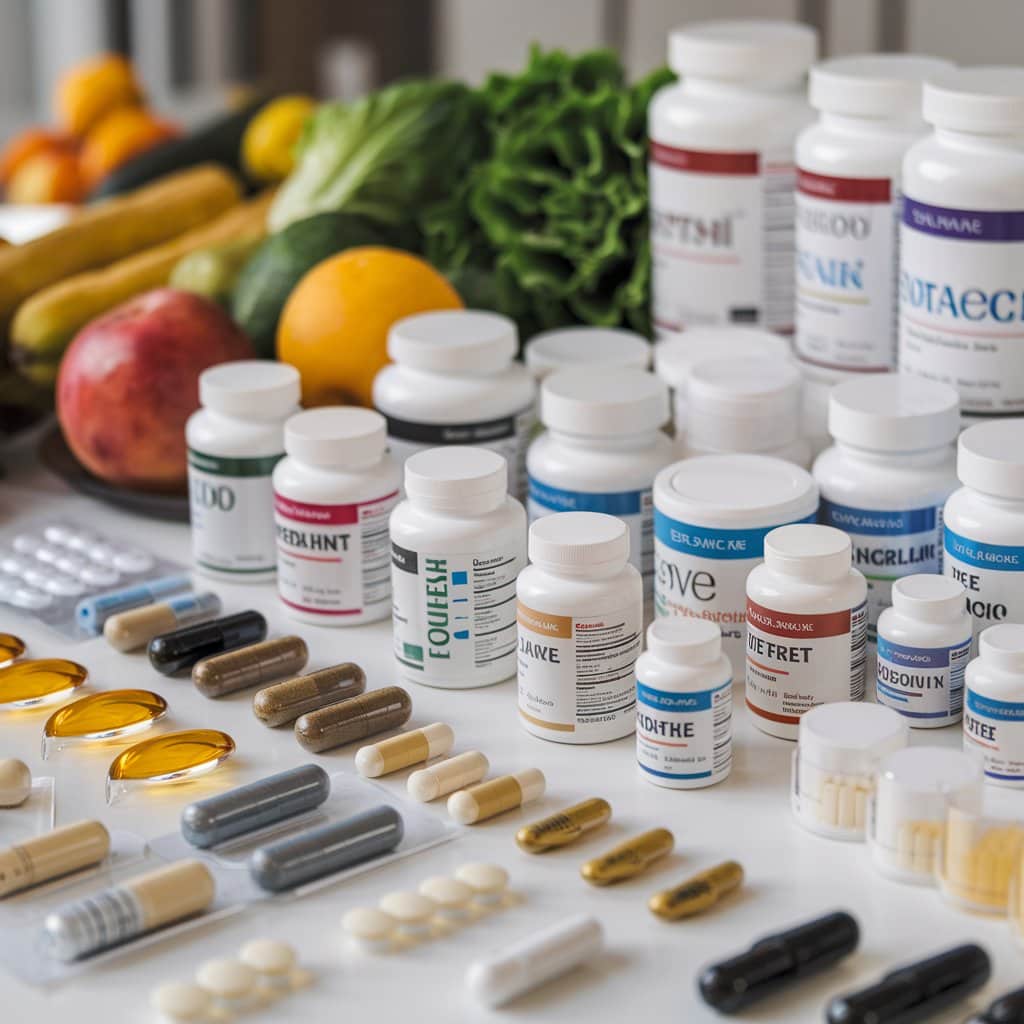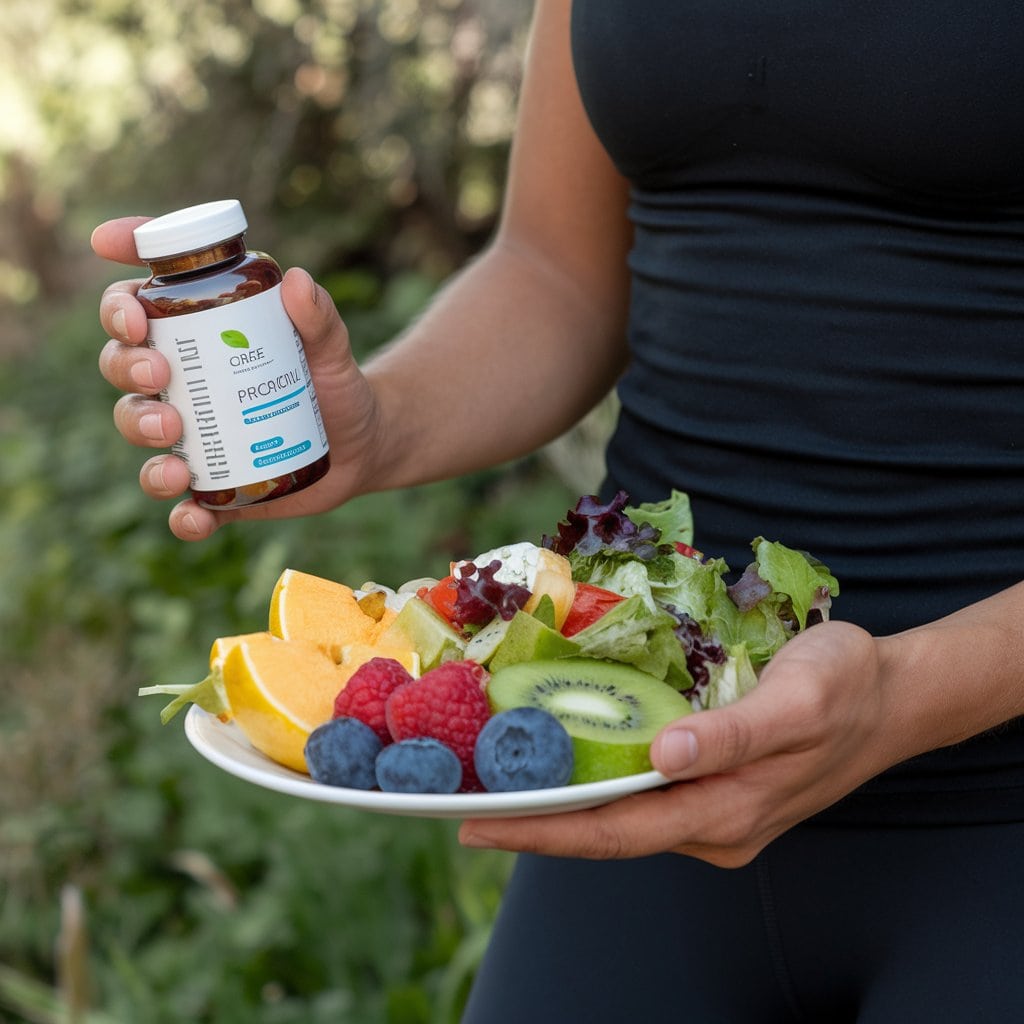

Join the Newsletter
Dive into quick, nutritious recipes, expert health tips, local food finds, and the latest in nutrition. Let’s explore healthier living together!
Don’t Depend Only on Dietary Supplements for Your Health

Affiliate Disclosure
Before reading this post, please be aware that some links in this article are affiliate links. This means that if you click on one of these links and make a purchase, we may earn a commission at no additional cost to you. We only promote products and services that we believe will be beneficial to our readers.
For more information, please read our full Affiliate Disclosure.
Introduction
The use of dietary supplements has become increasingly popular, with many people turning to them as a quick and easy solution for various health concerns. From vitamins and minerals to herbal extracts and protein shakes, the market for these products is vast and varied. However, depending solely on dietary supplements for your health is like using duct tape to fix a major leak—it’s a temporary solution that doesn’t address the underlying issues. Let’s delve into why relying exclusively on dietary supplements is not a sustainable approach to maintaining good health, and what you can do instead.

What Are Dietary Supplements?
Defining Dietary Supplements
Dietary supplements are products created to augment your daily diet. They typically contain one or more ingredients such as vitamins, minerals, herbs, amino acids, or other substances that aim to improve or enhance health. These supplements are available in various forms, including pills, capsules, powders, and even liquids.

Types of Dietary Supplements
Common dietary supplements include:
- Multivitamins: These combine various vitamins and minerals into a single pill.
- Vitamin D: It is frequently utilized to enhance bone strength and bolster the immune system.
- Omega-3 Fatty Acids: Known for their benefits to heart health.
- Protein Powders: Frequently used by athletes and bodybuilders.
- Probiotics: Beneficial bacteria that support digestive health.
- Herbal Supplements: Products like ginseng, echinacea, and turmeric used for their potential health benefits.
Why People Turn to Dietary Supplements
People may choose to take dietary supplements for numerous reasons. Some aim to fill nutritional gaps in their diet, others seek to boost energy levels, improve immunity, or enhance athletic performance. Some individuals use them for specific health goals, such as weight loss or anti-aging benefits.
How Supplements Fit into a Healthy Lifestyle
Supplements as Additions, Not Replacements
Dietary supplements should be viewed as additions to, rather than replacements for, a healthy diet. They can help address specific deficiencies or support health conditions, but they are not a substitute for the comprehensive nutrition that comes from whole foods.

When Supplements Are Necessary
Certain situations may necessitate the use of dietary supplements:
- Pregnancy: Folate is critical for fetal development, and iron supplements are often recommended.
- Vitamin D Deficiency: Individuals with little sun exposure might need vitamin D supplements.
- Vegetarian or Vegan Diets: These diets might require B12 supplementation since B12 is primarily found in animal products.
Importance of a Balanced Diet
A balanced diet supplies the body with a variety of nutrients in their most bioavailable forms. Whole foods provide not only vitamins and minerals but also other beneficial compounds like antioxidants and fiber, which play a vital role in overall health.
Drawbacks of Relying Only on Supplements

Incomplete Nutritional Profile of Supplements
Supplements often cannot replicate the wide range of nutrients found in whole foods. For example, taking vitamin C supplements provides ascorbic acid, but it does not offer the additional phytochemicals found in an orange, which work together to enhance nutrient absorption and health benefits.
Issues with Nutrient Absorption
The body may not absorb nutrients from supplements as efficiently as those from food. Factors like the supplement’s form, the presence of other nutrients, and individual health conditions can impact how well these nutrients are absorbed and utilized.
Potential Side Effects and Risks of Excessive Intake
Overuse of supplements can lead to side effects or toxicity. For instance, consuming too much vitamin A can cause liver damage, while high doses of iron can lead to gastrointestinal problems and more serious health issues.
Health Dangers of Overdependence on Supplements
Risk of Toxicity and Overdose
Certain vitamins and minerals, particularly fat-soluble ones like vitamins A, D, E, and K, can accumulate in the body and reach toxic levels if consumed in excessive amounts. Over time, this may lead to significant health issues.
Interactions with Medications
Some dietary supplements can interact with prescription medications, either reducing their effectiveness or causing adverse reactions. For example, vitamin K can counteract blood-thinning medications, while St. John’s Wort can interfere with antidepressants.
False Health Claims and Their Impact
The dietary supplement industry is not as strictly regulated as pharmaceuticals, allowing some products to make exaggerated or misleading health claims. This can lead consumers to believe they are more effective than they are, resulting in potential health risks.
The Superiority of Whole Foods

The Concept of Nutrient Synergy
Whole foods contain a combination of nutrients that work together to enhance each other’s effectiveness. This synergy improves the bioavailability and health benefits of these nutrients, something that isolated supplements often cannot replicate.
Unique Benefits of Antioxidants and Phytochemicals
Whole foods are rich in antioxidants and phytochemicals that help protect the body from oxidative stress and inflammation. These compounds play a significant role in preventing chronic diseases and are usually less potent in supplement form.
Role of Dietary Fiber
Dietary fiber, abundant in fruits, vegetables, whole grains, and legumes, is essential for maintaining a healthy digestive system, regulating blood sugar levels, and reducing cholesterol. Most supplements lack the fiber content found in whole foods.
Comparing Supplements with Whole Foods

Nutrient Richness of Whole Foods
Whole foods generally offer a higher density of essential nutrients compared to supplements. For example, a serving of broccoli provides vitamins, minerals, fiber, and antioxidants, whereas a supplement might only offer a single isolated nutrient.
Comparing Health Benefits
Research shows that diets rich in whole foods are linked to lower risks of chronic diseases like heart disease, diabetes, and cancer. High supplement intake alone does not demonstrate the same protective effects.
Long-term Effects on Health
While supplements can help correct short-term nutrient deficiencies, they are not a sustainable substitute for the long-term health benefits of a balanced, whole-food-based diet.
Importance of Overall Lifestyle Choices

Role of Physical Activity in Health
Consistent exercise is essential for sustaining overall wellness. It helps improve cardiovascular health, strengthen muscles and bones, enhance mental health, and manage weight.
Managing Stress Effectively
Chronic stress can negatively affect health, leading to conditions like hypertension and depression. Stress management techniques such as yoga, meditation, and regular exercise can significantly improve overall well-being.
Impact of Good Sleep on Health
Good quality sleep is crucial for both physical and mental well-being. Poor sleep is linked to various health issues, including obesity, diabetes, heart disease, and impaired cognitive function.
Seeking Professional Health Advice

Why Personalized Nutrition Advice Is Crucial
Nutritional needs vary greatly among individuals due to factors like age, gender, health status, and lifestyle. Personalized advice from healthcare professionals can help tailor supplement use and dietary habits to meet these unique needs.
Risks Associated with Self-Prescribing Supplements
Self-prescribing supplements without proper knowledge can lead to overuse, harmful interactions, and adverse effects. Consulting a healthcare provider ensures safe and effective supplementation.
Tips for Selecting Appropriate Supplements
If you decide to use supplements, choose products from reputable brands, look for third-party testing certifications, and avoid those with unnecessary additives or fillers.
Common Myths About Supplements
The Fallacy That More Supplements Equate to Better Health
It’s a common misconception that taking high doses of supplements will boost health. In reality, excessive intake can be harmful and does not necessarily provide additional health benefits.
Misconception That Dietary Supplements Can Replace Medical Treatments
Supplements are not a replacement for prescribed medications. They can support health but should never be used in place of medical treatment without a healthcare provider’s guidance.
Misunderstanding the Function of Vitamins and Minerals
Vitamins and minerals support various bodily functions, but they do not cure or prevent diseases on their own. They work best when consumed in balanced amounts as part of a healthy diet.
Regulation of Dietary Supplements

How Supplements Are Regulated
In many countries, dietary supplements are regulated less strictly than medications. They are often categorized as food products, meaning they do not require pre-market approval or rigorous testing.
Challenges in Regulatory Oversight
The lack of strict regulation allows for inconsistencies in supplement quality, potential contamination, mislabeling, and unverified health claims. Consumers must be vigilant in choosing reliable products.
Quality and Safety Issues
Due to varying quality standards, some supplements may contain harmful contaminants or provide inaccurate ingredient information. Opting for third-party tested products can help ensure safety and quality.
Economic Considerations of Supplement Use
Cost Implications of Dietary Supplements
Supplements can be costly, and regularly purchasing unnecessary products can become a financial burden without guaranteed health benefits.
Financial Impact of Unnecessary Supplementation
Spending on unneeded supplements diverts resources that could be better allocated toward nutritious foods or other health-promoting activities like fitness and wellness programs.
Profitability of the Supplement Industry
The dietary supplement industry is highly lucrative, often driven by aggressive marketing strategies that promote quick fixes, sometimes at the expense of consumer understanding and safety.
Guidelines for a Balanced Approach to Health
Combining Dietary Supplements with Nutritious Food
If supplements are necessary, they should be part of a balanced diet rich in whole, nutrient-dense foods. This ensures a broad spectrum of essential nutrients for optimal health.
Importance of Regular Health Assessments
Regular health check-ups and blood tests can help identify nutritional deficiencies and assess the need for supplements, ensuring that supplementation is targeted and appropriate.
Taking Care of Mental Health
Mental health is a crucial component of overall well-being. Activities that support mental health, such as hobbies, social interaction, and mindfulness, should be integrated into a holistic approach to health.
Real-Life Scenarios

Examples of Supplement Overuse
Consider cases where individuals excessively used supplements without professional guidance, leading to serious health complications such as kidney damage or vitamin toxicity.
Positive Health Outcomes from Balanced Eating Habits
Studies consistently show that individuals who consume a balanced diet rich in whole foods experience better health outcomes and reduced risks of chronic diseases.
Conclusion

While dietary supplements can play a supportive role in health, they should not be the foundation of your wellness strategy. A balanced diet, regular physical activity, stress management, and sufficient sleep form the bedrock of a healthy lifestyle. Supplements can help bridge nutritional gaps when necessary but cannot replace the holistic benefits of a well-rounded lifestyle. Before reaching for that supplement bottle, consider focusing on your overall diet and lifestyle habits.
FAQs
1. Can dietary supplements take the place of a healthy diet?
Supplementing your diet cannot replace the benefits of a nutritious diet. They are designed to complement a well-rounded diet, not replace the variety of nutrients found in whole foods.
2. Are there universal supplements everyone should take?
While some supplements, like vitamin D or omega-3 fatty acids, may benefit many people, it’s essential to consult a healthcare provider to determine individual needs based on personal health and dietary habits.
3. What are the symptoms of taking too many supplements?
Symptoms of supplement overuse can include nausea, headaches, dizziness, stomach pain, and, in severe cases, toxicity that could damage the liver or kidneys. Always consult a healthcare professional if adverse effects occur.
4. How do I determine if I need a supplement?
The best way to know if you need a supplement is through blood tests and consultations with healthcare professionals, who can identify deficiencies and recommend supplements tailored to your needs.
5. What should I check when purchasing dietary supplements?
When buying supplements, choose products from reputable brands, check for third-party testing certifications, avoid unnecessary additives, and consult a healthcare professional before starting any new supplement.

Welcome to Merge Blog!
Dive into quick, nutritious recipes, expert health tips, local food finds, and the latest in nutrition. Let’s explore healthier living together!

I’m Divya Bharathi, the person behind MergeBlog. I’m a passionate food enthusiast sharing simple, nutritious recipes and tips for a balanced lifestyle. Join me on this delicious journey!
Divya Bharathi
SUBSCRIBE & FOLLOW
MUST-READ ARTICLES
Join the Newsletter
Dive into quick, nutritious recipes, expert health tips, local food finds, and the latest in nutrition. Let’s explore healthier living together!





1 thought on “Don’t Depend Only on Dietary Supplements for Your Health”
Adippollliiii